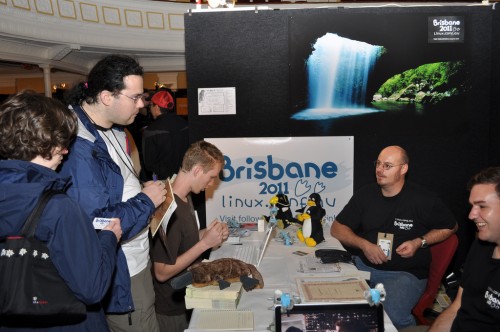I’m sure you’ve heard about it, but do you really know what it is, why it exists and why you should care?
Linux.conf.au (commonly abbreviated to LCA) 2011 is happening next week in Brisbane, Australia, and I’m going on behalf of OMG! Ubuntu! to cover the week long conference.
What is Linux.conf.au?
The annual conference is one of the largest Open Source conferences in the southern hemisphere, and one of three major international grassroots Linux conferences worldwide, the other two being Linux Symposium and Linux Kongress.
Originally founded in 1999 by Linux Kernel Hacker Rusty Russell under the acronym “CALU,” the conference changed its name to linux.conf.au in 2001, when it was held in Sydney.
LCA 2011 will be the 12th linux.conf.au, (11th if you don’t count CALU), and it is the second time it has been held in Brisbane, Australia. Previous locations include Perth, Melbourne, Adelaide and two conferences in New Zealand, Dunedin in 2006 and Wellington last year.

Each year LCA keeps growing, and this year the organizers were expecting a whopping 700 people to show up (this number will be influenced by the recent flooding) for the 5 days of keynotes, talks, sessions, workshops and social events that make LCA what it is.

What happens at an LCA?
During an LCA, there are several different “categories” of activities that take place in a tight schedule throughout the week.
- Miniconfs
- Keynotes
- Presentations
- Tutorials
- Social Events and BOFs
- Lightning Talks
Miniconfs were first introduced in 2002, and are a series of talks and presentations related to one specific area of Open Source software/hardware. They generally run for a half-day to two days worth of talks, and everything in between.
Recurring Miniconfs often include topics such as Debian, System Administration, Education, Open Source in Business and Multimedia.
For the Miniconf list at LCA 2011, see this post.
Keynotes are hour long talks by prominent leading people in the Open Source community. To give you an idea of how prominent these speakers are, in 2004 one of the keynote speakers was Linus Torvalds, the “father of Linux;” in 2006 Mark Shuttleworth, founder of Ubuntu was the leading keynote and this year we are treated to Google’s Vice President, Vint Cerf.
In fact, LCAs can take a lot of credit for Ubuntu, as Mark Shuttleworth hired a lot of people from LCA 2005 and 2006 in Dunedin to work on the foundations of Ubuntu. One of these people is Jeff Waugh.

Presentations are talks that happen throughout the day, on everything from The latest and coolest with HTML5 video to Building a Linux powered coffee roaster.
Tutorials are exactly what they sound like, a gathering of people who get together to learn a specific skill.
Social Events usually occur in the evenings, and involve people getting together to go out to a restaurant or a bar to talk about Linux, Open Source, and to network, exchange business cards and the like.

BOFs are topic-related meetups to talk about specific projects and/or software among many other things.
Lightning Talks are fast-paced 90-second long speed talks designed to keep the audience interested and engaged. They are usually held on the final day of the conference.
First time at an LCA? This guide may be of use.
Why should you care about LCA2011?
Conferences like Linux.conf.au spur innovation, enthusiasm and new projects, as well as allowing people to mix with others to discuss a common interest.
Conferences are where stuff gets done and where the magic happens.
But why listen to me? My good friend, LCA2011 Paper Chair and University of Queensland staff member Marco Ostini can elaborate some more:
“Each LCA has born great fruits: a peaceful understanding between the GNOME and KDE communities was initiated at an LCA, Mozilla sought and received great support from a previous LCA (Firefox & Thunderbird have grown lots since then) and OLPC received significant developer support at the 2008 LCA in Melbourne.”
LCA2011 is the first to host a Rocketry miniconf, where people can build their own solid propellant fuelled rocket, and purchase or build their own Open avionics, and then launch them to 5000 feet from a rocketry club at the end of the conference, and record the telemetry.

Pretty awesome stuff, right? But it doesn’t stop there. At each LCA, many Open Source friendly companies send along employees to mix with the community volunteers.
“IBM, HP and Google over the years understood that they are part of the community at an LCA, and not in a position to dictate to the community. Each of those companies have reaped massive benefits from their involvement with LCA.”
I asked Marco whether he agreed with the statement that LCAs lead to a lot of open source innovation and progress.
Indeed, A lot of FOSS is done by people who haven’t met. Once they do at an LCA, things change for the better.
Conferences like LCA are a big deal in the Open Source world. Decisions get made, people communicate, misunderstandings are resolved, and new projects are born and worked on. It’s a time when Open Source members the world over culminate in a fascinatingly strong bond, and it’s a prime example of what makes Open Source such a great thing.
Hence why I’m going to be flying to Brisbane on Sunday and reporting on as much as I can throughout the week, hopefully passing what I learn on to you guys. I’ll be there when projects make announcements, and I’ll provide a summary of the keynotes. I’ll also be running around with my DSLR and digital dictaphone grabbing photos of everything and interviewing people as much as I can.
If you want an insight into how Open Source is progressing, look no further than conferences like LCA – because this is the real deal.
For more posts related to LCA2011, make sure you check out our lca2011 tag.
